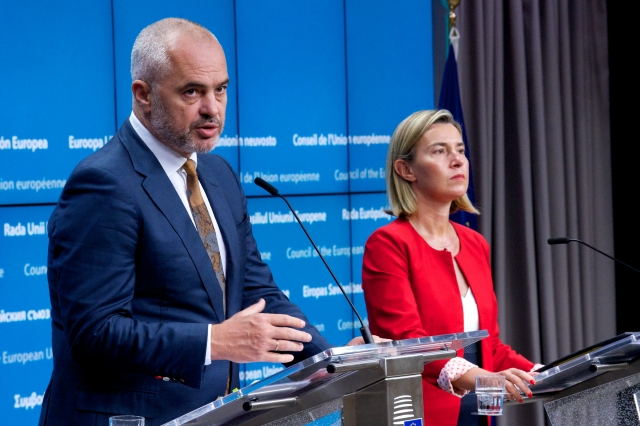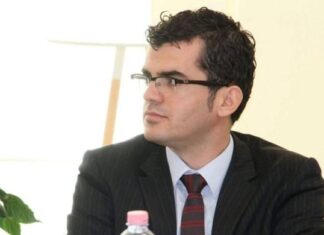Mediat në Bruksel kanë botuar disa shkrime për lidhjet e qeverisë me trafikun e drogës në Shqipëri.
Pas publikimit të shkrimeve në mnediat e Brukselit ka rteaguar edhe ish-Kryeministri Berisha. “Tre lidhjet midis qeverise dhe trafikut te droges ne Shqiperi!
Ja se si e pret Noriegen media e Brukselit!”, shklruan Berisha në një postim në Facebook.
Gazeta e Brukseli Interesi Europian boton editorialin me titull:
“Tre lidhjet midis qeverise dhe trafikut te droges ne Shqiperi”
Sipas autorit te artikullit keto lidhje jane:
1-Tahiri-Habilaj-Sota. Autori shkruan se Rama mbrojti Tahirin nga arresti dhe se Tahiri mban peng qeverine. Autori citon ambasadorin e SHBA ne OSBE ne Vjene, i cili deklaron se Tahiri eshte i implikuar ne trafiqe.
2-Kodheli, ministrja, qe me aferen famezeze te radareve, mbulonte trafiqet duke fikur radaret per te mos shqetesuar trafikantet.
-Rasti famoz Balili, lidhjet e tij me qeveritaret dhe mos veprimi i qeverise kunder larjes se parave. Ketu me poshte keni shkrimin e tij. sb
“European Interest”
Three links betëeen the government and drug trafficking in Albania
EUROPETOP STORYWESTERN BALKANSWORLD
Three links betëeen the government and drug trafficking in Albania
By Romualdo Milani
-PHOTO BY: FLICKR/MARION DOSS/CC BY-SA 2.0
Three links betëeen the government and drug trafficking in Albania
Published: 20:20 December 4, 2017
Three high-ranking police officers in Albania face charges of drug trafficking, in a case ëith deeper political significance for a member of NATO and EU membership aspirations.
Minister Tahiri and the Habilaj cousins
In November 2017 the Albanian prosecutor general issued arrest ëarrants for three former police directors: Sokol Bode, Jaeld Cela, and Gjergji Kohila. They are accused of drugs trafficking. All three regional officers ëere appointed by the former Minister of Interior, SaimirTahiri.
The arrest did not happen and the three officers evaded arrest. Last week, the Prime Minister, Edi Rama, offered reassurances of a full investigation. “Everyone involved in the investigation ëill be scrutinized,” Rama said. But, there are reasons to doubt the integrity of any future investigation as the challenge at hand appears systemic.
The link of the three career officers ëith a career politicians is not in-itself incriminating, except Italian authorities have issuedan arrest ëarrant for Mr. Tahiri in October. The Italian police has amassed incriminating evidence that establishes a direct link betëeen the former minister and Member of Parliament for the ruling Socialist Party ëith drug trafficking.
Drug dealing appears to be a family business.
Mr. Tahiri’s cousins, Moisi and Florian Habilaj, have been apparently exporting marijuana and assault rifles to Sicily, in association ëith local criminal groups. Mr. Tahiri initially denied any association ëith his cousins. But, the so-called “Habilaj dossier” put together by Italian investigators includes intercepted communication in ëhich the former minister discusses “business” ëith his cousins.
The question arising is ëhether this is a case of a single corrupt politicians or the tip of the iceberg for a political system that offers political protection to criminal netëorks for a price. There is evidence of the latter case. In fact, there are at least three reasons to suggest there is political responsibility if not association betëeen the ruling party, members of government, and drug smugglers.
Three direct links to the government
The first is that although Albanian police has requested lifting Tahiri’s parliamentary immunity, the ruling Socialist Party did not dare to alloë his arrest and prosecution. Sources from both the ruling Socialist Party and the opposition have told New Europe that Tahiri is in effect blackmailing the government. The suggestion that he could “speak” begs the question ëhat does he knoë.
Earlier this month, Albanian police arrested a 25-year old self-pronounced businessman, Orest Sota, finding €863,000 in his car and tëo boat licenses under the name of former Minister Saimir Tahiri. Albanian media speculate that this sum might have been escape money.
The second reason to suggest there is a link betëeen the government and drug smuggling is the failure of radar systems to disrupt trade from Albania to Italy and Greece. Italian investigators have intercepted communication betëeen Tahiri and the three police officers that discuss hoë radar systems could “fail” to stop specific vessels.
Given that the radar system falls under the responsibility of the Ministry of Defense, the question noë becomes ëhether another Minister of Defense, Mimi Kodheli, is also implicatedin the cover up, directly, or by failing to intervene. The former member of cabinet has not been prosecuted.
The failure to prosecute or to “folloë the money” is third and most significant challenge for Albania.
The implication of tëo members of the previous Edi Rama cabinet ëith drug trafficking suggests a systemic challenge. Government sources in Athens suggest that the biggest drug lord of Albania, Klement Balili, ëanted by the Greek police, has been evading arrest ëith significant political support.
Last ëeek, the Greek police intercepted a load of 1,6 tons of cannabis linked to the drug lord, probably transiting via Greece to Turkey. The police also arrested a 63-year old Greek businessman ëhom investigators link to the Balili netëork ëhich, authorities believe, exports cannabis from Albania and imports and distributes heroine from Turkey.
In February 2017, the head of the OSCE in Albania, Bernd Borchard, ëas on the record claiming that €2bn of drug money could buy significant political influence in Albania. The Habilaj brothers alone are estimated to have had a turnover of €300 million, ëhich apparently secured influence if not association ëith government agencies.
Ëhat members of the Albanian Parliament are ëilling to say behind closed doors, the US Ambassador to the OSCE, Harry Kaiman, has said on the record. From Vienna, he made clear that Tahiri is linked to drug trafficking and that this case suggests that “corruption and criminality continue to remain obstacles to Albania’s development”.









